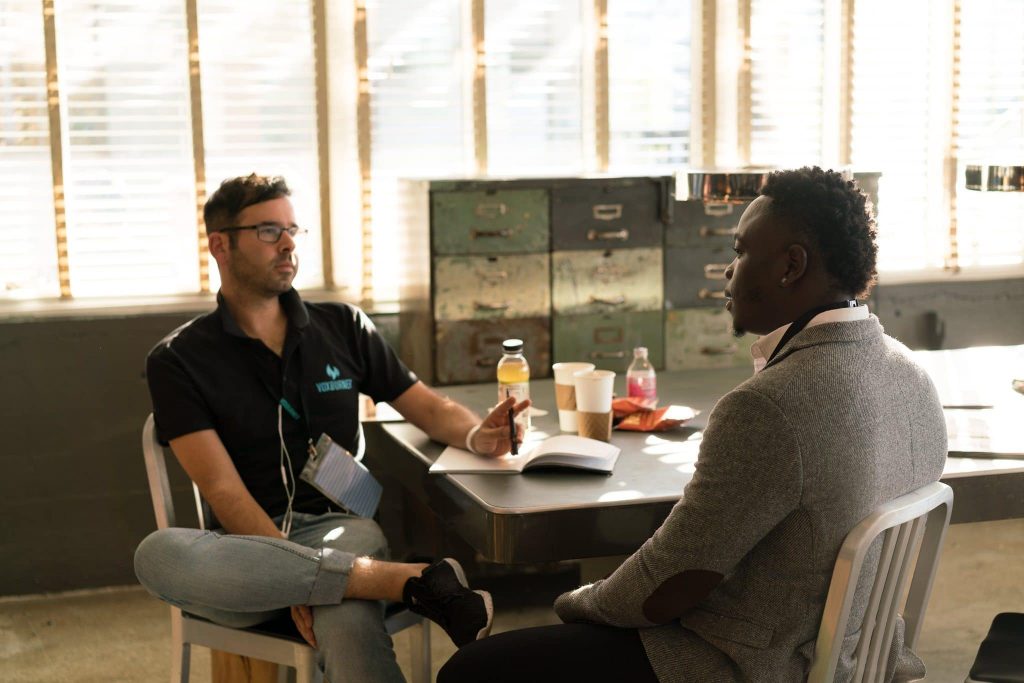Kim Scott is the author of Radical Candor: Be a Kick-Ass Boss Without Losing Your Humanity and Radical…
Speak Truth to Power by Embracing the Principles of Radical Candor
Brandi Neal is the Radical Candor podcast writer and producer, and director of content creation for Radical Candor. She has 20 years experience as a writer and editor covering topics like career and lifestyle, news and politics, arts and culture, and everything in between for myriad print and digital outlets.
One of the main ways to build a Radically Candid culture is by creating an environment where people feel empowered to speak truth to power.
This kind of culture can only be achieved when managers understand that it is authentic relationships and not power that drive them forward. Unfortunately, finding a job that fosters this kind of culture can feel akin to finding a unicorn.

However, companies that do encourage people to speak truth to power build trust between employees, no matter their role in the organization. Case-in-point, video-software company Wistia. The team read Radical Candor together and then had a virtual Q&A session with author and Radical Candor, LLC co-founder Kim Scott.
They’ve since been committed to actively practicing Radical Candor and reached out to us to share an experience about what happened when an employee used the principles of Radical Candor (caring personally while challenging directly) to speak up about an offensive term used in a meeting.
Speaking truth to power is difficult in any situation, but it’s more likely to happen in an environment where people feel a sense of psychological safety. Where they feel they will be heard and acknowledged versus being retaliated against.
In her book The Fearless Organization: Creating Psychological Safety in the Workplace for Learning, Innovation, and Growth, Harvard Business School Professor Amy Edmonson says that psychological safety allows people to give candid feedback, openly admit mistakes and actively learn from each other.

In this situation, the term “digital sharecropping” was used during a team presentation. Coined by author Nicholas Carr, digital sharecropping is described as “the distribution of production into the hands of the many and the concentration of the economic rewards into the hands of the few.” The term is problematic because sharecropping is deeply tied to racial inequality.
While most people’s first instinct is to avoid making others uncomfortable, and to remain quiet, even if feeling uncomfortable themselves, one team member, Kristen Bryant, a brand marketing and partnerships manager, decided to address the issue. Bryant provided feedback that was kind, clear and direct, sharing her own experience in service of everyone’s growth.
“During the presentation, I was completely thrown by the use of the term ‘digital sharecropping.’ As a Black woman from the South, sharecropping makes me think of racism, leftover slavery, oppression and poverty. And immediately, this is where my mind goes,” she said in an email to the team.
“I fundamentally understand how content creators are giving dollars to the big media companies, but we can find better language to describe this trend. I was in my head from that point forward and I think I might have missed the rest of the presentation,” Bryant continued.
“During the presentation I was completely thrown by the use of the term ‘digital sharecropping.’ As a Black woman from the South, sharecropping makes me think of racism, leftover slavery, oppression and poverty. And immediately, this is where my mind goes.” — Kristen Bryant, Wistia
“Instead, I was struggling with how this term might have made [other people of color on the team] feel. Struggling with whether or not I should provide feedback. Wondering whether or not my colleagues were proud that they found a term that was succinct. Wondering if I would have said anything about it in the meeting where it originated.”
This internal struggle is one that so many people can relate to. Should I say something? What will happen? Will I be supported by my team? Will I face retaliation?
Acknowledging Unconscious Bias
Bias in the tech industry, and within the actual coding itself, is something Princeton University Professor Ruha Benjamin writes about in her book Race After Technology: Abolitionist Tools for the New Jim Code. “Presenting the concept of the ‘New Jim Code,’ [Benjamin] shows how a range of discriminatory designs encode inequity by explicitly amplifying racial hierarchies,” the book description notes.
Along these lines, the term “digital sharecropping” is still being widely used to describe pay-to-play web content trends, which highlights the lack of awareness present in the industry in 2019. A better term to describe this practice might be digital tariffs or digital leasing.
When one person coins a term that goes viral in an industry, others can pick it up without thinking through what that term might actually mean, which is what happened in this instance. But when you examine what the words mean culturally and historically, it’s easy to see how they are harmful and offensive to an entire group of people. While that may not have been the intention, it was the impact. And Radical Candor is measured not at the speaker’s mouth, but at the listener’s ear.
It’s hard enough to be Radically Candid with those who look like us. It’s even more difficult when people look different, speak a different language or practice a different religion. We are all more likely to be “ruinously empathetic” or “obnoxiously aggressive” or “manipulatively insincere” toward people who are different from us. This is what the nonprofit Project Implicit refers to as, “implicit social cognition — thoughts and feelings outside of conscious awareness and control.”
This means you may be biased against people who are different from you without being consciously aware of it, and this bias may cause you to treat people differently or use hurtful language without understanding the implications. Becoming aware of our own bias may be uncomfortable, but it’s necessary to acknowledge it in order to create a culture of inclusion.
Speak Truth to Power
Learning how to push ourselves and others past this discomfort, to relate to our shared humanity, can make a huge difference. What transpired at Wistia is a perfect example of the good things that can happen when people feel safe enough to push past their discomfort.
“If this email makes you uncomfortable, then it probably mimics how I felt in the meeting. This sounds more emotional than I am about it — I really just want to inform on my perspective more than make anyone feel guilty. Also, know I always assume the best intentions from my colleagues,” Bryant explained. “I just wanted to let you know how the term impacted me in the hopes that it won’t be included in further [communications] about this.”
Because the team at Wistia is committed to practicing Radical Candor — encouraging people to care personally about the people they work with while also challenging each other directly — Bryant felt empowered to speak up.
What’s more, the person who gave the presentation actively listened, actually heard the feedback and immediately addressed the team.
“I want to take a moment to call attention to, and reflect on, a term I used yesterday when talking about the future of content marketing work: sharecropping. First and foremost, I want to sincerely apologize for my ignorant use of the term and any pain it may have caused.”
In this case, the presenter acknowledged the mistake and accepted responsibility. Next, they said they were grateful for the candid feedback.
“I feel grateful to work in a culture where we can openly learn from our mistakes, and I’m very thankful that someone on the team exercised Radical Candor and let me know that the meaning of the word is deeply rooted in slavery, and how that made them feel.”
Finally, the person who used the term encouraged others to speak up in similar situations. “I want to say that too many times I have found myself or others sitting quietly and allowing offensive words and actions to be used because doing otherwise is too uncomfortable. If you find yourself in a situation of discomfort, whether due to a conversation, workshop or presentation, I hope you feel empowered by the Wistian who kindly called this out.”
Not only is this situation an example of a successful execution of Radical Candor, it was done so in a way that encourages everyone on the team to give guidance and feedback no matter their position on the team.
The experience the team at Wistia went through highlights that you have to be not just self-aware but relationally and culturally aware, too. While feedback can be difficult to hear, especially when you’ve made a mistake, Radical Candor is a process that allows everyone to learn and grow.
About Wistia
Wistia is proud to help more than 500,000 businesses grow with video. Their software is designed to engage and grow an audience, turning passive viewers into brand fans. In addition to their world-class video hosting, they offer tools for businesses to present their videos in a binge-worthy Channel to keep viewers engaged, the ability to grow a list of subscribers and email them every time a video is published, and integrations so businesses can leverage viewer data to retarget and reach new audiences with social media ads.
————————————————————————————————————————————————————————————–
- Take the Radical Candor quiz >>
- Sign up for our Radical Candor email newsletter >>
- Listen to the Radical Candor podcast >>
- Shop the Radical Candor store >>
- Get Radical Candor coaching and consulting for your team >>
- Get Radical Candor coaching and consulting for your company >>
If you understand the importance of communication in the workplace, then you need The Feedback Loop (think Groundhog Day meets The Office), a 5-episode workplace comedy series starring David Alan Grier that brings to life Radical Candor’s simple framework for navigating candid conversations.
We’re offering Radical Candor readers 10% off the self-paced e-course. Follow this link and enter the promo code FEEDBACK at checkout.




